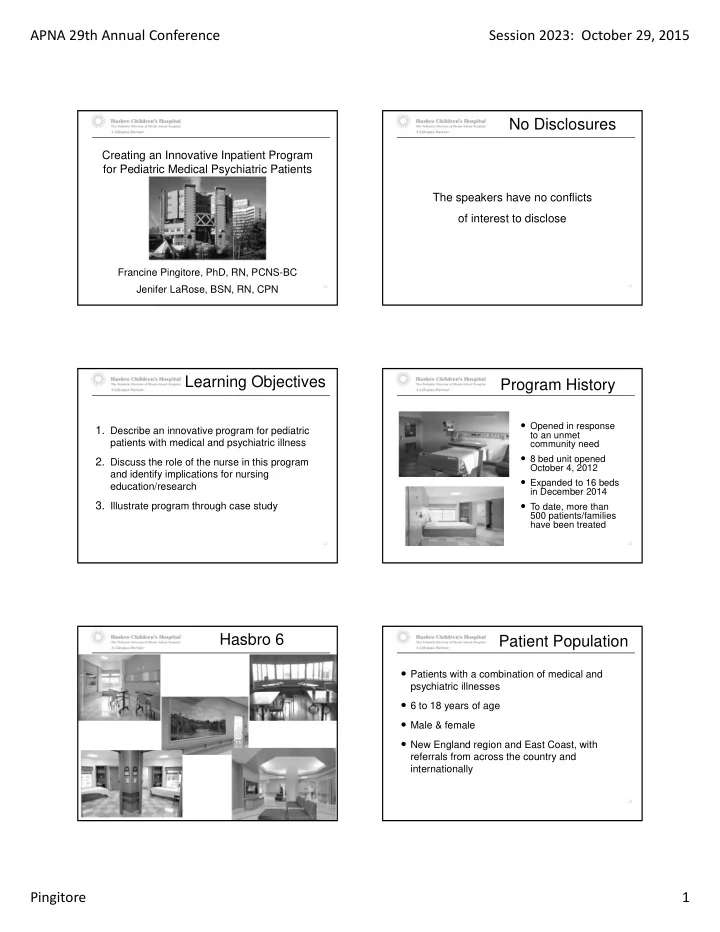

APNA 29th Annual Conference Session 2023: October 29, 2015 No Disclosures Creating an Innovative Inpatient Program for Pediatric Medical Psychiatric Patients The speakers have no conflicts of interest to disclose Francine Pingitore, PhD, RN, PCNS-BC Jenifer LaRose, BSN, RN, CPN Learning Objectives Program History Opened in response 1. Describe an innovative program for pediatric to an unmet patients with medical and psychiatric illness community need 8 bed unit opened 2. Discuss the role of the nurse in this program October 4, 2012 and identify implications for nursing Expanded to 16 beds education/research in December 2014 3. Illustrate program through case study To date, more than 500 patients/families have been treated Hasbro 6 Patient Population Patients with a combination of medical and psychiatric illnesses 6 to 18 years of age Male & female New England region and East Coast, with referrals from across the country and internationally Pingitore 1
APNA 29th Annual Conference Session 2023: October 29, 2015 Mission and Philosophy Integrated Care Model Psychiatrists The mission of the Hasbro Inpatient Medical PT/OT Pediatricians Psychiatric Program is to provide family based integrated care to children and adolescents with Consulting Nurses Physicians complex medical and psychiatric illness. Patient Interdisciplinary acute care is aimed at diagnostic & Social Mental Health Workers Workers Family clarification and medical psychiatric stabilization of safety and functioning to support transition to longer Child Life Advanced term follow-up, ranging from outpatient to residential Specialist Practice Nurses care. Nutrition Volunteers Psychologists Program Schedule Multidisciplinary Staff 7:00-7:30 wake up 2:45-3:00 snack 7:45-8:15 breakfast 3:00-4:00 reflection time 8:30-9:00 community meeting 4:00-4:30 day in review 9:00-10:00 community activity 4:30-5:00 community activity 10:00-10:15 snack 5:00-5:30 dinner 10:30-12:00 school 5:30-7:30 open activity 12:00-12:30 lunch 7:30-8:00 reflection time 12:30-1:00 free time 7:45-8:00 snack 1:00-2:00 group therapy 8:30-9:30 bedtimes/lights out 2:00-2:45 community activity visiting hours 2:30p-4p & 6p-8p Program Highlights Program Highlights Zumba Special Visitors Yoga Pet Therapy Massage Therapy Cartoonist Pingitore 2
APNA 29th Annual Conference Session 2023: October 29, 2015 Therapeutic Modalities Implications for Nursing Individual therapy Practice Practice Group therapy Education Family therapy Nursing Research Milieu therapy Research Education Nurses in the Milieu Advanced Practice Nurses Expert Pediatric Nurses by training Child & Adolescent Pediatric Nurse Practitioner Psychiatric CNS History & Physicals Received comprehensive psychiatric nursing Provides therapy Examinations education Prescribes Prescribes Uniquely qualified Consultant Educator Educator Nursing Research Nursing Education Many possibilities of areas • Initial education prior to investigate! to unit opening Nursing education • Yearly nursing Nursing practice competencies Patient outcomes • Ongoing educational opportunities Patient experience Pingitore 3
APNA 29th Annual Conference Session 2023: October 29, 2015 Case Study Case Study Previously healthy & physically active 12 y.o. male: Presented to Hasbro 6 in April 2014 with a diagnosis of • Contracted a GI illness in November 2014 conversion disorder: • Comprehensive medical work up negative Wheelchair bound • Progressively worsening physical symptoms: Multiple fainting episodes-requiring mechanical lifts throughout the day Severe abdominal pain Wearing sunglasses & covering face with clothing Sensitivity to light and temperature Unable to hold a spoon or pencil 13 pound weight loss Inability to walk Unable to attend to basic self-care activities: eating, toileting, hygiene Multiple episodes of fainting/non-epileptic seizures Case Study Case Study Course of treatment lasted 4 months: Including inpatient & partial hospital program Intensive patient/family therapy & education Individualized multidisciplinary behavior plan Frequent phone conferences with parents Multidisciplinary services involved: Neurology Physical & Occupational Therapy Pain Team Integrative Therapies Thank You! Case Study Jenifer LaRose, BSN, RN, CPN Clinical Manager Hasbro 6 jlarose@lifespan.org (401) 444-6068 Francine Pingitore, PhD, RN, PCNS-BC Child & Adolescent Psychiatric Clinical Nurse Specialist fpingitore@lifespan.org (401) 444-5636 Pingitore 4
Recommend
More recommend